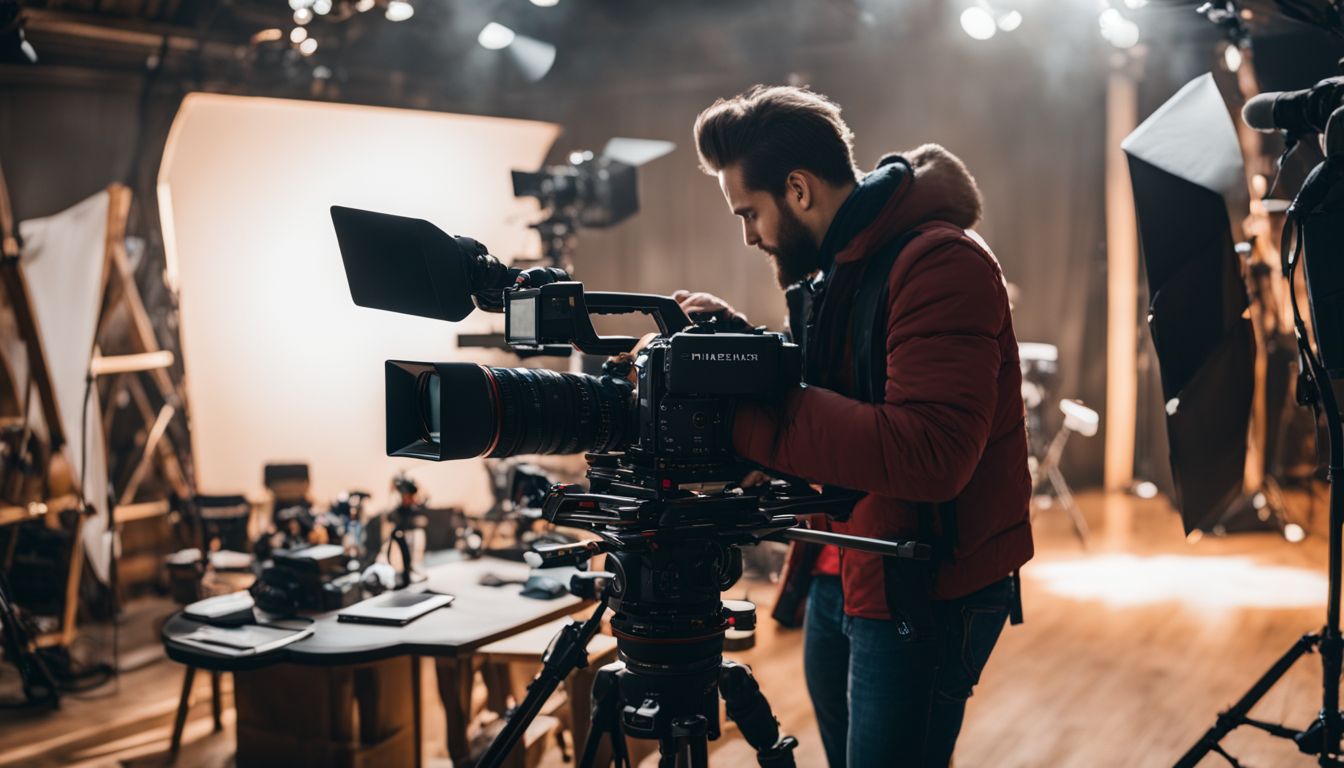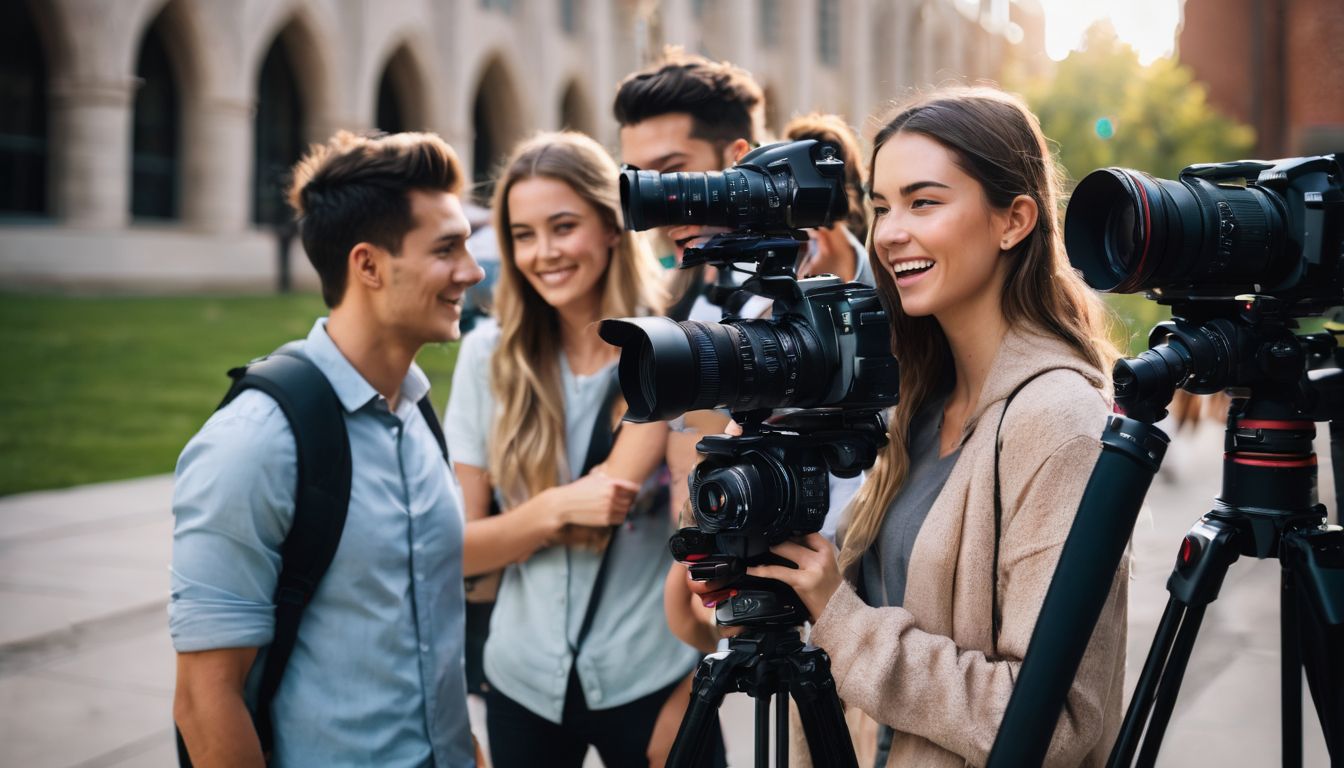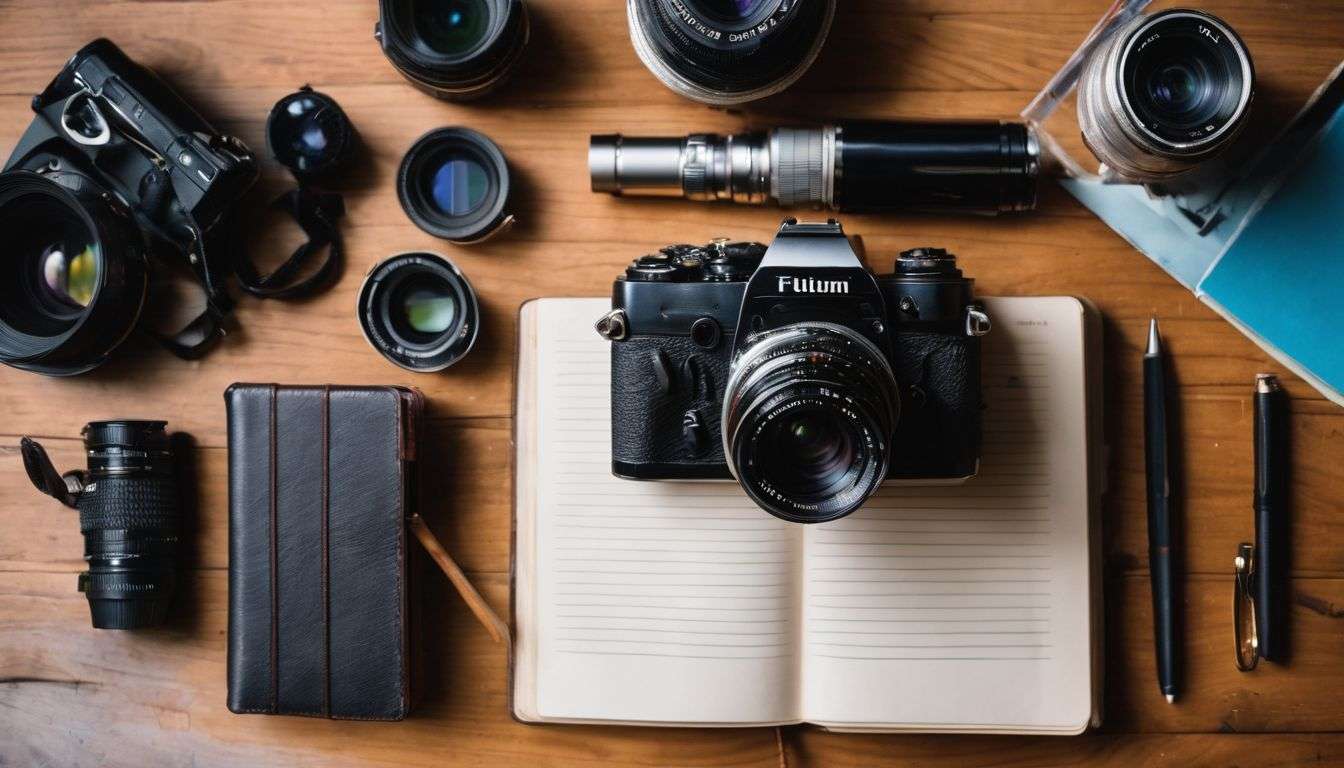Initiating a career as a videographer can often feel akin to attempting to decipher an intricate puzzle – it’s comforting to know that you’re not alone in these feelings! We’ve navigated through the labyrinth of bewilderment ourselves, sifting meticulously through numerous resources just to figure out how best to set things into motion.
Rest assured, in this article, we’ll grapple with all your burning queries: from securing relevant education and fine-tuning technical skills, right up to crafting an impressive portfolio and taking confident strides into professional job roles.
Tempting prospect? Stick with us and let’s unravel the mysteries of videography together!
Key Takeaways
- A videographer is a professional who captures and records video footage for various purposes such as events, films, documentaries, or marketing campaigns.
- To start a career as a videographer, pursue a videography education or courses to gain the necessary skills and knowledge in this field. Gain practical experience and build a portfolio to showcase your work.
- Essential skills for videographers include technical skills in equipment and software, creativity in storytelling, strong communication abilities, and collaboration skills.
- Career opportunities for videographers include working as cinematographers, camera operators, video editors, documentary filmmakers, wedding videographers, corporate videographers or freelancers.
What is a Videographer and What They Do

A videographer is defined as a professional who captures and records video footage for various purposes, such as events, films, documentaries, or marketing campaigns. They are responsible for operating the camera equipment, setting up lighting and audio equipment, and creating visually appealing videos that effectively communicate a story or message.
Definition and role of a videographer
A videographer is a pro at making videos. They use a camera to capture moving images and sounds. They often edit what they shoot into a full video story. Some work for companies, others work alone.
A videographer’s job can take them many places like weddings, sports events, film sets, or TV studios. They can also make movies or documentaries. Their main goal is to tell stories with their videos in the best way possible.
Responsibilities and tasks of a videographer
A videographer has many tasks to do. Here is a list of them:
- A videographer must know how to plan and edit videos.
- They use cameras, lights, and microphones for shooting.
- Part of their job is to decide what scenes to capture.
- They need strong storytelling skills.
- They are in charge of making sure the video looks good.
- Videographers also improve sound quality in videos.
- Sometimes, they help with writing scripts for videos.
- They must be good at working with others on a team.
- Spending time on fixing issues is part of their work too.
- A videographer often must move equipment from place to place.
Steps to Start a Career as a Videographer

To start a career as a videographer, one must first pursue a videography education or courses to gain the necessary skills and knowledge in this field.
Pursue a videography education or courses
Taking a videography course or getting an education in this field is the first step to becoming a videographer. Here are some key points to remember:
- Opt for a diploma, degree or specific courses in videography after finishing high school.
- Look for programs that cover key topics like video production, film – making, cinematography and camera operation.
- Learn about video editing, lighting techniques, composition, audio recording and storytelling as part of your course.
- Get a Certificate IV in Screen and Media if you can. This adds weight to your qualifications.
- Make sure your learning does not end with theoretical knowledge. Join hands – on classes too.
- Practice what you learn as much as you can by creating videos on your own or by participating in student projects.
Gain practical experience and build a portfolio
Gaining hands-on experience and building a portfolio are key steps in becoming a videographer. Here’s the how-to:
- Start by helping more experienced videographers. This gives you a chance to learn from them.
- Try working on different video projects. You can do this through internships or freelance work.
- Make sure to record all the work you do. This will help show your skills to future employers or clients.
- Keep adding new works to your portfolio as you gain more experience and improve your skills.
- Get as much work as possible, even if it is not paid at first.
- Don’t shy away from hard tasks or big projects, they will make you better at your job.
How to Start Being a Videographer: A Comprehensive Guide
Laying the foundation for a videography career begins with education. You need to master the basics of video production and editing. There are many courses you can take to get this knowledge.
Many start with obtaining a degree in screen and media or similar fields after their high school diploma.
Then, it’s time to gather experience. This may mean starting as camera assistants or runners on a film set. It’s also good to try different types of projects like weddings or documentaries.
This will give you exposure and practice.
Another key step is building your portfolio as a videographer. Your portfolio should show off your best work and varied skills in visual storytelling, cinematography, composition, lighting techniques, audio recording and others.
Certifications can also help your career path. They show that you have specific skills above what most people have learned from their formal degrees.
In summary: learn well, do lots of work, showcase your work carefully, then consider getting certified!
Consider certifications or specializations
Becoming a videographer often involves more than just a basic education. You should think about getting certifications or choosing a special area to become better at:
- Look into certificates in videography. These can boost your skills and make you stand out.
- Try many types of video work. Then, decide on your favourite one.
- Wedding videography is one choice. It needs special tools and skills.
- Learn how to do something not all videographers can do. For example, drone camera operation.
- Join groups or clubs for videographers. This can give you chances to learn and meet others in your field.
- Aim to get known for something special in your video work.
- Keep up-to-date with new tools and methods. Videography changes fast, so it’s good to stay aware of what’s new.
Essential Skills and Requirements for Videographers
To succeed as a videographer, you need technical skills in equipment and software, creativity in storytelling, and strong communication abilities. Find out more about the essential skills and requirements for videographers to start your journey in this exciting field.
Technical skills in videography equipment and software
We are going to talk about the technical skills you need to work with videography equipment and software.
- First, know how to use a video camera. Understand how to change settings for different light and angles.
- Second, learn about audio recording. Good sound is vital in videos too.
- Then, get familiar with lighting techniques. Light can set the mood of your video.
- Also, have mastery of video editing software. You should be able to cut, merge and add effects.
- Lastly, know how to care for your gear. Your tools should always be in top shape.
Creativity and storytelling abilities
Creativity and storytelling abilities are essential skills for videographers. As a videographer, you need to be able to think outside the box and come up with unique ideas to capture your audience’s attention.
Your creativity will help you in choosing interesting angles, compositions, and shots that tell a compelling story. Storytelling is also crucial in videography as it allows you to convey emotions, messages, and narratives through your videos.
By mastering visual storytelling techniques such as using lighting, composition, and audio recording effectively, you can create videos that engage viewers on an emotional level. These skills will set you apart as a videographer and make your work more memorable.
Strong communication and collaboration skills
Having strong communication and collaboration skills is crucial for a videographer. This includes being able to effectively communicate with clients or team members to understand their vision and requirements for a project.
Collaboration skills are also important when working on set or in a team, as it involves coordinating with other professionals such as directors, camera operators, and sound technicians.
Clear communication ensures that everyone is on the same page and can contribute their best work. Collaboration allows for the pooling of ideas, resources, and expertise to create high-quality videos.
Career Opportunities and Salary Expectations for Videographers
Videographers have various job options available to them, including working as cinematographers, camera operators, video editors, or even starting their own video production company.
The average salary range for videographers can vary depending on factors such as experience, location, and the specific industry they work in.
Various job options for videographers
There are many job options for videographers. Here are some of them:
- Camera operator: Operates cameras to capture footage for various projects such as films, television shows, or commercials.
- Video editor: Edits and assembles raw footage into a cohesive and engaging video.
- Cinematographer: Works closely with directors and production teams to create the visual look and feel of a film or video.
- Documentary filmmaker: Creates non-fiction films that document real-life events, people, or issues.
- Wedding videographer: Specializes in capturing wedding ceremonies and events to create lasting memories for couples.
- Corporate videographer: Creates videos for companies to promote products, showcase events, or communicate messages internally.
- Freelance videographer: Works independently on various projects, allowing for more flexibility and creative freedom.
Average salary range for videographers
The job of a videographer can indeed be a rewarding one, and salary plays a huge part in that reward. The income of a videographer can vary widely depending on various factors such as their level of experience, geographic location, and the demand in the industry. For a better idea of what to expect, here’s an approximate average salary range for videographers:
| Experience Level | Average Annual Salary |
|---|---|
| Entry Level (0-1 years) | £20,000 – £25,000 |
| Early Career (1-4 years) | £25,000 – £30,000 |
| Mid Career (5-9 years) | £30,000 – £40,000 |
| Experienced (10-19 years) | £40,000 – £50,000 |
| Late Career (20+ years) | £50,000 and above |
Please note that these figures are estimations and the actual salary can vary based on numerous factors. It’s also worth noting that freelance videographers may have the potential to earn more, depending on the number and scale of the projects they undertake. Specializing in a niche field, like wedding videography, can also impact earnings positively.
Conclusion
To start being a videographer, it’s important to pursue a videography education and gain practical experience. Obtaining certifications and building a portfolio will enhance your skills and credibility.
With the right education, experience, and strong technical and creative abilities, you can embark on an exciting career as a videographer. So grab your camera, master the basics, and start creating amazing videos!
What Are the First Steps to Becoming a Videographer?
When embarking on the path to becoming a videographer, it is essential to understand the videographer requirements. Firstly, investing in a high-quality camera and appropriate lenses is crucial. Secondly, gaining foundational knowledge in cinematography, composition, and storytelling through courses or self-study is essential. Lastly, practicing shooting and editing videos regularly will refine your skills and help you grasp the technical aspects of videography.
What Lighting Equipment Do I Need to Start Being a Videographer?
To kickstart your journey as a videographer, you’ll require some essential lighting equipment for videography. A versatile LED panel is a must-have, enabling you to control the intensity and color temperature for various shooting conditions. Additionally, softboxes create diffused, flattering light, while reflectors bounce light back onto the subject. Don’t forget to invest in light stands and batteries for portability. With these tools in your kit, you can illuminate your scenes and enhance the overall quality of your videos.
FAQs
1. What skills do I need to start being a videographer?
To start being a videographer, you should have basic knowledge of operating a camera, framing shots, and editing videos. Developing creativity and storytelling skills can also be beneficial.
2. Do I need expensive equipment to become a videographer?
No, you don’t need expensive equipment to become a videographer. Many smartphones or entry-level cameras can capture high-quality video. As you progress, you may choose to invest in more advanced gear.
3. How can I gain experience as a beginner videographer?
As a beginner videographer, you can gain experience by practicing filming and editing on your own projects or collaborating with friends or local organizations for small assignments or events.
4. Are there any online resources that can help me learn about videography?
Yes, there are plenty of online resources available such as tutorials on YouTube channels and websites dedicated to teaching the basics of videography and providing tips for improvement.
5. Can I make money as a videographer?
Yes, it is possible to make money as a professional videographer through freelance work, collaborations with businesses or individuals who require video content creation, or by offering services for events like weddings or corporate functions






